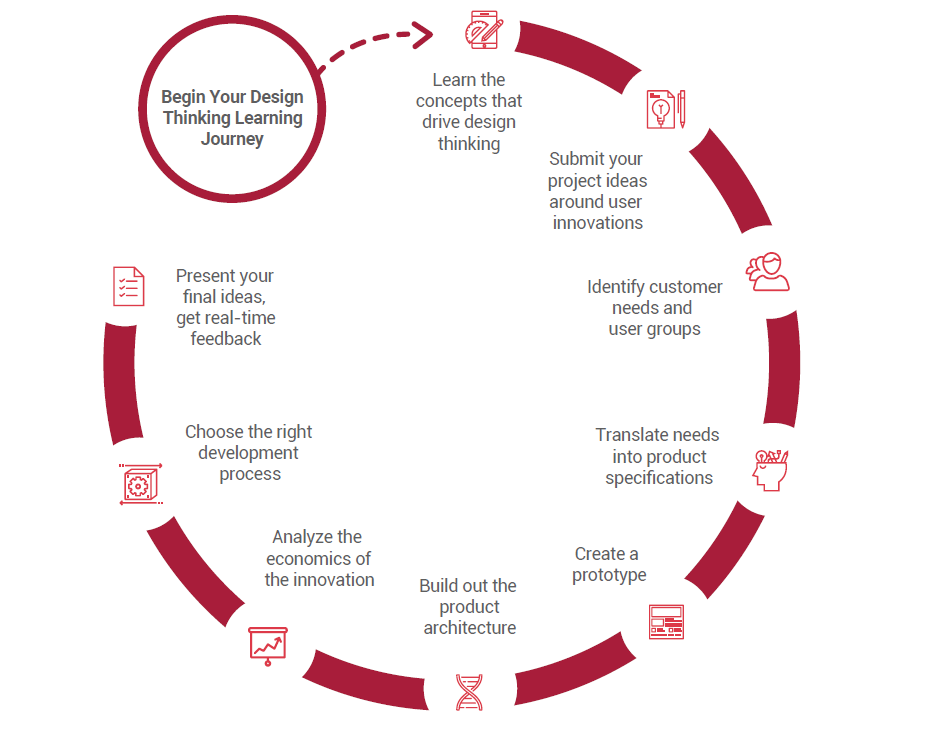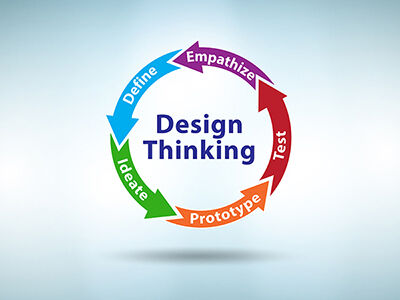Mastering Design Thinking
Mastering Design Thinking
| Course Dates | Format | Duration | Time Commitment | Price |
|---|---|---|---|---|
| Jun 6-Aug 29, 2024 | Self-Paced Online (date based) | 3 months | 6-8 hours/week | $3,300 |
Tracks
Strategy and Innovation
Certificate Credits
3.0 EEUs
Topics
- Organizations & Leadership
- Strategy & Innovation
Course Highlights
- This course runs over 3 months with an estimated 6-8 hours per week of study time
- This course is delivered in our Self-Paced Online format which enables you to participate at your own pace within weekly modules
- You will learn through a variety of formats including: interactive videos, practice quizzes, presentations, assignments, and discussion forums
- You will have access to a Success Adviser who will help you manage your time, and support you with any administrative or technical queries you might have
- You will earn a certificate of course completion from the MIT Sloan School of Management
Course Snapshot
Why attend Mastering Design Thinking?
Design thinking is a powerful approach to new product development that begins with understanding unmet customer needs. It’s a human-centered design process that approaches problem-solving with understanding the user needs. Design thinking encompasses concept development, applied creativity, prototyping, and experimentation. When design thinking approaches are applied to business, the success rate for innovation has been seen to improve substantially.
Design-driven companies such as Apple, Coca-Cola, IBM, Nike, Procter & Gamble, and Whirlpool have outperformed the S&P 500 over the past 10 years by an accumulated 211% in what's called the Design Value Index—a portfolio of 16 publicly traded companies that integrate design thinking into corporate strategy. According to a 2016 report from the Design Management Institute, this marks the third consecutive year the index has shown an excess of 200% over the S&P 500.
The Mastering Design Thinking program will lead participants through a step by step, design thinking process. To be considered successful, innovations have to solve the three key dimensions of Desirability, Feasibility, and Viability.
Desirability: Is this product or service addressing a real customer need?
Feasibility: Can we develop a solution that is technically feasible and better than competitors?
Viability: Is there a viable business model around this product or service?
Learn more about the self-paced online experience.
Learn more about Emeritus technical requirements.
Applying to the Course
Enrollment for this course is done through the Emeritus website. You can begin the application process by using the red Enroll Now bar at the bottom of the screen and clicking on the “Go to Emeritus Site” button.
Upon successful completion of your course, you will earn a certificate of completion from the MIT Sloan School of Management. This course may also count toward MIT Sloan Executive Certificate requirements.
Upon completion of this program, you will be able to:
- Understand the design thinking process.
- Identify and assess opportunities through customer needs analysis.
- Create clear product specifications based on customer needs that are desirable, feasible, and viable.
- Generate and evaluate new product and service concepts through applied creativity.
- Implement a proven 4-step method for planning and executing a prototype.
- Design services for enriched customer experiences.
- Create and establish a robust product architecture.
- Evaluate the economics of product development.
- Design products and services with sustainability in mind.
- Plan and manage innovation projects effectively.

Sample Schedule—Subject to Change
This program is for individuals and teams who want to adopt the powerful practice of design thinking in their organization. Whether entrepreneur or intrapreneur, anyone responsible for driving innovation and growth should attend, including functional and cross-functional teams.
MIT Sloan Executive Education is collaborating with online education provider EMERITUS Institute of Management to offer a portfolio of high-impact online programs. By working with EMERITUS, MIT Sloan Executive Education is able to broaden access beyond on-campus offerings in a collaborative and engaging format that stays true to the quality of MIT Sloan and MIT as a whole.
EMERITUS’ approach to learning is based on a cohort-based design to maximize peer to peer sharing and includes live teaching with world-class faculty and hands-on project based learning. In the last year, more than 7,500 students from over 120+ countries have benefited professionally from EMERITUS’ courses.
| Course Dates | Format | Duration | Time Commitment | Price |
|---|---|---|---|---|
| Jun 6-Aug 29, 2024 | Self-Paced Online (date based) | 3 months | 6-8 hours/week | $3,300 |
Tracks
Strategy and Innovation
Certificate Credits
3.0 EEUs
Topics
- Organizations & Leadership
- Strategy & Innovation
